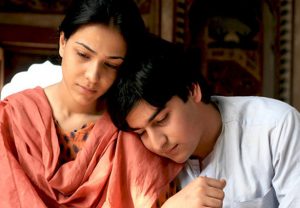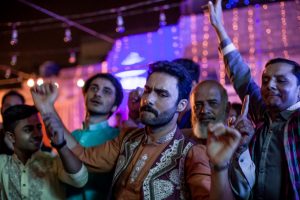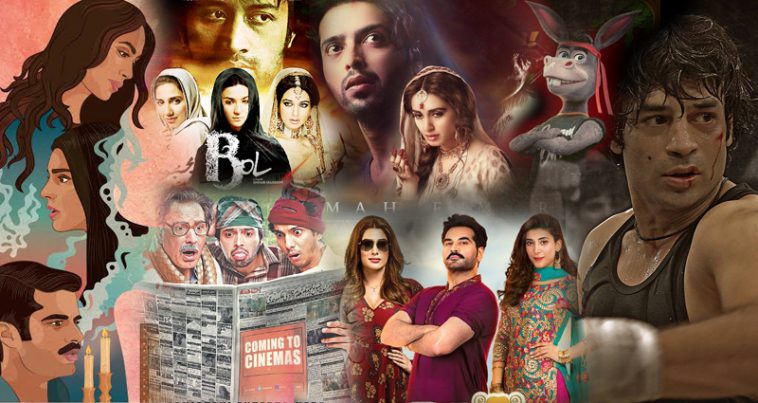Disclaimer: This list comprises of films that the PakistaniCinema.Net team loved the most this decade. It is a matter of opinion and is completely subjective. Though we’ve tried our best to be objective about listing films on their technical and creative merits alone, personal bias and sentiment are inevitably part of any list where any art form is ranked.
These are in no particular order.
BOL (2011)
Bol was Shoaib Mansoor’s triumphant return to the silver screen after the explosive “Khuda Kay Liye”. This time he chose to tackle the issue of women’s rights and the patriarchy. The film featured excellent performances by Manzar Sehbai, Humaima Malick, Iman Ali, Shafqat Cheema, and Amr Kashmiri (who played an intersex person). The film also featured the debuts of Atif Aslam and Mahira Khan who were appreciated for their roles. However, the breakout performance of the film by far was by Humaima Malick who caused shudders all over Pakistan with her dialogue “Jab Khila Nahin Saktay Tou Paida Kyun Kartay Ho?”

“Bol” also featured a great soundtrack that made waves across Pakistan. It included the voices of Atif Aslam, Sajjad Ali, Shabnam Majeed, and Hadiqa Kiyani among others. The film’s message and its treatment were widely praised and it resonated well with audiences. It remains a landmark film in the last decade of Pakistani cinema.
Zinda Bhaag (2013)
“Zinda Bhaag” was quite refreshing when it came out and it’s still an underrated gem. At a time when everyone was gushing over “Waar” and trumpeting the revival of Pakistani cinema, this almost flew under the radar by comparison. Featuring Khurram Patras, AmnaIlyas and the venerable Naseer uddin Shah, this film was about three friends in Lahore trying to get a visa to escape Pakistan…by any means necessary. While a film about illegal immigration isn’t new territory, it certainly was approached that way for a Pakistani film.
“Zinda Bhaag” is a black comedy about the game of life and making it by hook or by crook. It’s very reminiscent of a lot of classic Urdu novels and short stories in a certain way. It’s darkly funny, yet never melodramatic. This was certainly a first for Pakistani cinema. The typical morals and righteous meanderings of the protagonist were put to the side for a portrait of reality. While it remains underrated, it’s definitely one of our favorites.
Na Maloom Afraad (2014)
Director Nabeel Qureshi and Fizza Ali Meerza’s debut feature opted for a title familiar to every citizen of Karachi. Taking full advantage of Karachi’s nationwide image, the director-producer duo produced a film that would kick off a different type of commercial cinema in Pakistan.
“Na Maloom Afraad” featured Jawed Sheikh, Fahad Mustafa, Mohsin Abbas Haider, Salman Shahid, Urwa Hocane, and Kubra Khan. It featured good performances all over but the stars were undoubtedly the three protagonists. Shot in locations like Saddar and Zebunnisa Street, this was a film that every Karachiite could relate to. More than that, it showed Karachi as it was to most of its citizens. Not the sprawling metropolis where billions are made, but an arena where the toughest survive. It featured gangs, bank robbers, looters, mobs, and everything that Karachi was infamous for around the country. The film also featured Mehwish Hayat in the item song “Billi” which, whatever you think of it, made huge waves.
“Na Maloom Afraad” emerged a critical and commercial success due to its relatable storyline and its commercial appeal. It also remains relevant and fresh even after 6 years of release. We still can’t help but crack a smile when we watch the trailer.
Shah (2015)
Pakistan has a lot of sports heroes, however, unfortunately, none of them have had a film made about them. That changed with Adnan Sarwar’s“Shah”. This biopic on Syed Hussain Shah, the lone Olympian boxer from the mean streets of Lyari had quite a few powerful punches in store. It follows the adolescent Shah rise from poverty to become a multiple gold medalist, and back to poverty again.
Adnan Sarwar shot this on a shoestring budget with actual boxers from Lyari. He starred in the main role and actually took the punches that are shown in the film. He had such little resources that he ended up editing the entire film on his laptop. It was a herculean effort getting this film made, but Pakistan’s film history is all the richer for it. Shah also features a brilliant performance from Gulab Chandio as Kareem Chacha. He takes Shah as a child and supports him throughout his journey from the streets to the ring.
The brilliance of “Shah” isn’t just that it presents Pakistan with a forgotten hero, but that it does it in larger context. Boxing isn’t just shown as Shah’s passion, but a means of escape from the gang wars that plague Lyari. It also makes an important point about no sport other than cricket being given its due in Pakistan.
Shah lands many great blows in nearly every department. It deserves all the attention it gets.
Mah e Mir (2016)
If there was any doubt that Fahad Mustafa was a capable actor it was put to the side with “Mah-e-Mir”. Directed by Anjum Shehzad and written by Sarmad Sehbai, it’s a rather unconventional take on certain parts from the life of Mir Taqi Mir, the legendary poet. It features a dual storyline, chronicling Mir’s days in Delhi and Lucknow and a young poet, Jamal’s days in present-day Karachi. Both roles are ushered by Fahad Mustafa to perfection. Nowhere does he seem out of his element, even when speaking in the finest Urdu dialect from old Lucknow and Delhi.
The film features a good performance by Manzar Sehbai as well, who ushers the role of Dr. Kaleem Ahmed, a poet and critic. Others like Iman Ali who features as the figurative ‘Mah’ and Sanam Saeed, who plays the role of a modern poetess, play their parts well. However, it’s Fahad Mustafa that shines in every frame. This is his film through and through.

However, lest you think this film favours personality over discourse, let me put your fears to rest. It features conversations about the state of poetry and literature in modern times and the importance of the classics. It also features discourse on the nature of love and poetry itself. Plus it features an opening sequence that is to die for. Oh, and did I mention that it is filled with symbolism galore?
The only negative about the film is also its greatest strength. It features complex Urdu dialogue and even pure Persian in some places. Hence, it’s not very accessible to the common man. Its niche appeal does however, have an undeniable charm.
Actor in Law (2016)
“Actor in Law” was a huge surprise when it first hit theaters. Nabeel Qureshi and Fizza Ali Meerza had hit it out of the park with their second venture. Starring Fahad Mustafa, Mehwish Hayat, Saleem Meiraj, Aly Khan, and the late Om Puri in his last performance, the film is an old school social satire.
Fahad Mustafa stars as Shan Mirza, a down on his luck actor. His father, Rafaqat Mirza played by Om Puri, a lawyer by profession, hopes that his son will follow in his footsteps. Fortune favours Shan Mirza in a way that falls in between the law and the stage.
The film shines a light on multiple problems Pakistan is facing today including child labor, the power crisis, sexual harassment, etc. Of course, because it does so in a humorous fashion, the film delivers that message in a very digestible manner.
“Actor in Law” stayed in theaters for months on end and became the highest-grossing film of the year. It solidified Fahad Mustafa’s status as Pakistani cinema’s golden boy, and it won acclaim from audiences and critics alike. As far as commercial entertainers go, this one has it all.
Punjab Nahin Jaungi (2017)
What Khalil Ur Rehman Qamar chose to name, this film was half the reason audiences flocked to theaters, at least in Punjab. Starring Humayun Saeed and Mehwish Hayat this was a boy meets girl story on the surface. It shows Humayun Saeed’s character Fawad Khagga wooing Mehwish Hayat’s character Amal fairly early into the film. However, the film takes a turn into unfamiliar territory when Fawad Khagga begins to grow bored of Amal’s aspirations. She has aspirations beyond just being a housewife and instead takes over the family dairy business.
While the film does feature a few clichés here and there, it takes a few steps forward for women empowerment. Fawad Khagga is shown to be in the wrong for not changing with the times. He’s also shown to sacrifice his ego when it’s important. That itself is a step forward in an industry where women are usually shown as schemers and melodrama queens.
The film also features some excellent dialogues by Khalil Ur Rehman Qamar which were credited for the success of the film. “Punjab Nahi Jaungi” emerged as the highest grossing Pakistani movie in history the year it was released and it clearly resonated with audiences and critics alike. And so, of course it has a place on this list.
Cake (2018)
If this list was ranked on the basis of performances alone, “Cake” would perhaps take the top spot. It features two powerhouse performances by Aamina Sheikh and Sanam Saeed. Set in rural Sindh, the film concentrates on a feudal family that is dealing with its own demons, parental health problems and a hidden secret.
Not for nothing, but as far as realism and acting chops go, this film takes the cake. The other performances in the film by veteran actor Syed Mohammad Ahmed, Adnan Malik, and Beo Zafar are great too. However, when Sanam Saeed and Aamina Sheikh are on screen, everyone else melts in to the background.
The film’s climax which is a 10-minute continuous take is a breath of fresh air in an industry that very rarely takes risks. Continuous shot takes are now more common in foreign film industries and even television shows, but not in Pakistan. The range of emotions and settings the film goes through in that 10-minute span shows how well Pakistani artists, cinematographers, directors, DOPs, can do given the opportunity. Everyone in the entertainment industry should take a page out of Cake’s book and challenge themselves more.
Director Asim Abbasi has done terrifically well for his debut feature and we expect even better from him in the future.
The Donkey King (2018)
The only animated film on this list is Aziz Jindani’s“The Donkey King”. He’s the creator of the nationwide hit, “Commander Safeguard”. This film clearly added to his string of successful animated shorts as it became the highest grossing animated film in the country’s history. The sleeper hit of 2018 was not only massively entertaining, but it was also poignant.
“The Donkey King” was released at a time when a new government had just come into power. The film, coincidentally, featured a donkey being installed as king instead of the lion by the media (monkey), and a politician (fox) . Obviously the citizens of Pakistan started arriving at their own conclusions at what the film was about. Even though Aziz Jindani clarified that his intentions were not at all political, the firestorm of YouTube comments under the trailer said otherwise.
“The Donkey King” features a lot of symbols, whether intentional or not. The timing of the film could perhaps be credited with it emerging as such a huge hit. However, the fact that children as well as parents were storming the theaters to get a ticket is reassuring about the future of animation in the country. If nothing else “The Donkey King promises that animation is far from a niche genre in Pakistan.
Laal Kabootar (2019)
In a year that was a little disappointing after the explosive 2018, “Laal Kabootar” was a huge surprise. We at PakistaniCinema.Net have made no secret of loving “Laal Kabootar”, and for good reason. Nearly everything in this movie is on point. The story is carefully woven, the first scene catches your attention, and it showcases the world of Karachi perfectly. If “Zinda Bhaag” was a film Lahore could call all its own, “Laal Kabootar” is that for Karachi.
The story features a series of crimes intended to cover up a larger game, one that most Karachiites and the public in general, is familiar with. Karachi’s merciless, brutal streets are captured beautifully, bathed in reds, yellows and oranges. Subtle hints towards the film’s larger meaning are made even more effective through the performances of the lead and supporting cast.

Mansha Pasha, Ahmed Ali Akbar, and Saleem Meiraj are all perfectly cast in their roles. They leave no room for doubt in who they’re playing and what they’re aiming for. Grey characters are left grey, and there are no unnecessary moral redemption arcs that solve everything at the end. However, the show stealer is without a doubt Rashid Farooqui as Inspector Ibrahim. He thrashes criminals, demands bribes, and yet plays dress up with his young daughter all without missing a beat. Such characterization is rare in an industry where we’re so used to absolutes.
Pakistani cinema has just begun to take flight again and we hope that films continue to pull audiences into theaters. Not only that, but we hope much greater films, performances, and experimentation take place to even blow these choices out of the water. We have so much talent in writing, directing, acting, cinematography, music, that is yet to be explored.
Strength to strength, Pakistan Zindabad!



Comments
0 comments